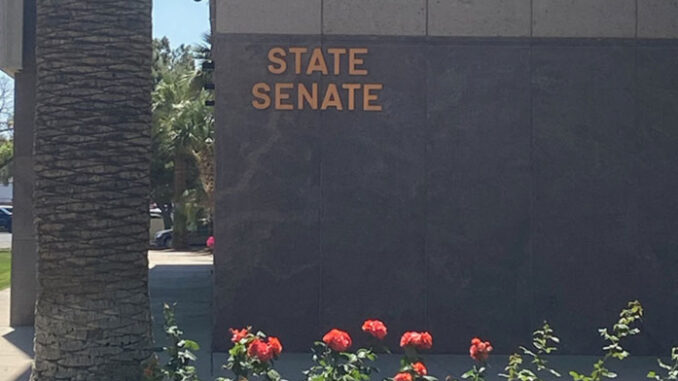By Terri Jo Neff |
Arizona lawmakers have increased the aggregate expenditure limitation (AEL) for the state’s K-12 schools, eliminating the need for those schools to make more than $1.1 billion in spending cuts with several months left in the current school year.
House Concurrent Resolution 2039 allowed for the overall spending cap for all of the public schools to be lifted by a total of $1,154,028,997. The bipartisan resolution was introduced by House Speaker Rusty Bowers (R-LD25) and co-sponsored by Rep. Reginald Bolding (D-LD27).
It passed the House last week on a 45 to 14 vote, with 17 Republicans voting with the Democratic caucus to ensure the required two-thirds “supermajority” margin.
HCR2039 then came up for a vote in the Senate on Monday, passing on a 23 to 6 supermajority margin after 9 Republicans joined with all 14 of the chamber’s Democrats. Voting nay were Michelle Ugenti-Rita (LD23), Wendy Rogers (LD6), Warren Petersen (LD12), Vince Leach (LD11), David Gowan (LD14), and Sonny Borelli (LD5).
The only two legislators who did not cast a vote on the resolution were Rep. Athena Salman (D-LD26) who is on maternity leave and Sen. Kelly Townsend (R-LD16).
After Monday’s vote, Senate President Karen Fann directed the resolution be returned to the House so Speaker Bowers can transmit it to the Arizona Secretary of State. The governor’s signature is not required for enactment of the resolution.
Failure to pass the resolution by March 1 would have caused Arizona’s K-12 schools to begin planning for spending cuts. There was some debate as to whether school administrators would have actually had until April 1 to implement the cuts, but by law the Legislature’s deadline is March 1.
Issues with the AEL have been the subject of discussion for several years. It stems from the fact the Arizona Constitution requires the Economic Estimates Commission (EEC) to annually determine an AEL for all public school districts for the next fiscal year.
The AEL is currently calculated by adjusting the expenditures of local revenues for all school districts in FY1980 to reflect the changes in student population and the cost of living and multiplying the result by 1.10. Critics note the local revenues base has not been adjusted for four decades.
For FY2022, the EEC calculated the AEL for all public school districts to be $6,019,638,192. That figure is then compared against an annual report from the State Board of Education (SBE) of the actual aggregate expenditures of local revenues for all districts for the current year.
SBE calculated the FY2022 aggregate expenditures of local revenues to be $7,173,667,189.
When the SBE figure exceeds the AEL, the Legislature must authorize spending in excess of the AEL but only up to the SBE amount. Which is what lawmakers just did for this fiscal year. Or the SBE must notify each school district of the amount by which it may have to reduce its expenditures for the rest of the year despite the fact the money has been budgeted.
The passage of HCR2039 only applies to raising the AEL cap for the current fiscal year. Unless voters amend the Arizona Constitution’s calculation process the same limitation situation will likely continue.
A vote on the AEL could have taken place last month, but many lawmakers were waiting for a ruling from Judge John Hannah of the Maricopa County Superior Court about whether Proposition 208 revenues would exceed the current aggregate expenditure limit.
Prop 208 narrowly passed in November 2020 to enact a 3.5 percent tax on income above $250,000 ($500,000 married filing jointly). This is on top of the existing 4.5 percent tax rate for income above $159,000 ($318,000 married filing jointly).
A legal challenge followed, and last August the Arizona Supreme Court issued a ruling that Prop 208 revenues applied toward the AEL and thus would be unconstitutional if the taxes collected actually exceeded the spending cap. The justices then sent the case back to Hannah to crunch the numbers.
Hannah was made aware of the Legislature’s March 1 deadline and even acknowledged that some lawmakers wanted to see his ruling in the Prop 208 case first. However, the judge told the parties earlier this month that he has until March 10 under court rules to issue his ruling, and he did not intend to jump the case in front of others also awaiting rulings.








